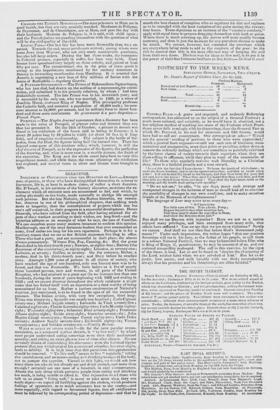GLEANINGS.
INFLUENCE OF OCCUPATION UPON THE DURATION OF LIFE—Amongst men of genius, or those who have distinguished themselves in science or literature, life is, at least in modern times, of rather a short duration. Mr. D'Israeli, in his estimate of the literary character, mentions the ex- citement which all eminent men are accustomed to feel, and which, by acting physically on the brain, tends naturally to abridge life amongst such persons. But the late Niebuhr, the Roman historian, we remem- ber, observes in one of his 'philosophical Chapters, that nothing tends more to longevity, than the contemplation of projects which one has one's self conceived, in their progress to a successful development. Hence Generals, who have retired from the field, after having attained the ob- jects of their warfare according to their wishes, are long-lived—and the historianadduces as an example of what he says, the case of Camillus. We can ourselves quote many modern instances to confirm this opinion. 3larlborough, one of the most fortunate leaders that ever commanded an army, lived rather too long for his own-reputation. Perhaps it is for a contrary reason that we see so few British statesmen live long in office. Those who lead a party, and are unsuccessful in their plans, die almost always prematurely. Witness Pitt, Fox, Canning, &c. But the great Bacon died in his sixty-fourth year ; Newton, at eighty-four ; Harvey (the discoverer of the circulation), at eighty-eight; Linnaeus, at seventy-one ; Leibnitz, at seventy ; Galileo, at seventy. On the contrary, Bichat, a modern, died in his thirty-fourth year ; and Davy before he reached sixty. Amongst 1,700 cases of persons in all classes of society, who have reached the age of one hundred, only one literary man was to he found, and that was Fontenelle. We have before us a list of nearly three hundred persons, men and women, in all parts of the United Kingdom, who had attained to a great age (in no- instance less than one hundred), during the term of years beginning with 1807 and ending in 1823 ; and we cannot discover throughout the whole catalogue a single name than has linked itself with an expression or a deed worthy of being eemembered for an hour. Rather a curious confirmation of Niebuhr's doctrine, just mentioned, is to be found in the ages of all the successful painters. The Italian artists, with very few exceptions, lived long: Titian was ninety-six ; Spenello was nearly one hundred ; Carlo Cignani ninety-one ; Michael Angelo ninety ; Leonardo da Vinci seventy-five ; Calabresi eighty-six; Claude Lorraine eighty-two; Carlo Maratta eighty- eight ; Tintoretti eighty-two ; Sebastian Ricci seventy-eight ; Francesco Albano eighty-eight ; Guido sixty-eight; Guercino seventy-six ; John Baptist Crespi seventy-six ; Giuseppe Crespi eighty-two ; Carlo Dolce seventy ; Andrew Sacchi seventy-four ; Zucharelli eighty-six; Vernet seventy-seven ; and Schidon seventy-six.-3/onth/y Review. WHAT IS MEANT BY LIVSHU WELL?—By far the most popular recom- mendation, as a safeguard against cholera, is " to live well ;" by which most people understand eating somewhat inure then their accustomed quantity, and taking an extra glass or two of wine after dinner. No one certainly thinks of diminishing his allowance : even the habitual tippler protests that any withdrawal of his accustomed stimulus, however slight, leads to debility. It is high time that this pernicious misapprehension should be removed. " •To live well," means to live " regularly," taking due nourishment, and no more—eating and thinking to support the body, not to pamper the appetite. Viewed in this light, we would ask how many there are who do not already eat and drink enough, and more than enough ? certainly not one man of a hundred, in easy circumstances. Almost the only thing which prevents people from eating and drinking too much, is being unable to afford it. Our injunction to a:1 those who talk to us about " living well," is never to take more than they can easily digest—to regard all fortifying against the cholera, which produces feelings of oppression, as so much assistance lent to the enemy—and more especially, with. regard to fermented liquors, that all exhilaration must be followed by its corresponding period of depression—and that'he
stands the best chance of exception who so regulates his diet and regimen as to be attended with the least variation of the pulse during the twenty- four hours. These objections to an increase of the " creature comforts," apply with equal force to persons drugging themselves with bark or quint". W here there is much screwing up, the nerves will more readily become unstrung, and then is just the moment for any prevalent disease to make its attack. We cannot, however, but commend the exertions which are everywhere being made to add to the comforts of the poor : let the rich be assured that this is the most effectual way of keeping the evil from their own doors. The best way for them to live well, is to put it in the power of their less fortunate brethren to live better..31eclical G azett


























 Previous page
Previous page